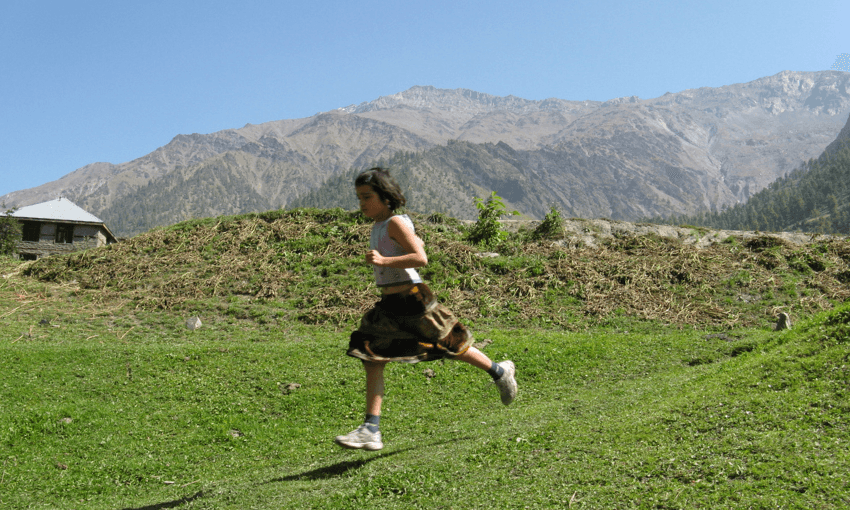For four years, Shanti Mathias learned at home, with her siblings as her only classmates. She reflects on the experience.
Every now and then, when I go to my parents’ house, I find a relic of my years of homeschooling in the back of a drawer. For the four years that my siblings and I were homeschooled, regular packages would arrive from The Correspondence School, now known as Te Kura. The bags were dark green, with flaps on the top, sturdy. Inside were booklets to fill out, art supplies and copies of School Journals. Once they were empty, we reused them to hold muesli or keep books dry on camping trips.
We were homeschooled because we lived in a remote area of India with no English-language schools, and the resources from Te Kura were our connection back to the place we’d been born. Outside, wildflower meadows grew high and lush and the khaki river nibbled at the last dirty remnants of snow; inside our house, we were reading about ice creams and beaches. New Zealand sometimes seemed like a dream, revealed in textbooks and attempts to make ginger crunch, not direct experience.
School would finish at lunchtime so my parents could do some work; in the afternoons, my siblings and I would do ironically-named homework – spelling, addition, reading Danny The Champion of the World to debate the morals therein – then be free to do what we wanted.
I remember lots of hours reading the encyclopaedia while shelling sweet, juicy peas from the fields next door. My siblings and I played a spy game, and would have meetings on the rock in the river to take notes about whether any of our neighbours had done anything suspicious (they never had). We made little rafts to float down the irrigation ditches and trained for cross country – a three kilometre loop through the fields, which my brother won every year – or played badminton. Family videos from that time, when I was between the ages of six and 10, are chaotic: four loud children surrounding my mum with the camera, demanding attention, making faces, full of opinions.
The possibility for projects was endless, taking full advantage of whichever adults around had time to help. My dad used the dial-up internet to look up the size of the planets, so we could attempt to make to-scale models of the first five planets of the solar system. I felt sorry for my sister, who had chosen Jupiter and discovered it was a lot of work. A visiting surveyor taught us some basic orienteering skills, and we followed the compass across the bridge, marking landmarks on the way; when heavy snowfall meant we had to stay inside at the hospital that had employed my parents, we did a unit on blood, making models of arteries and visiting the lab to test our blood types with little droppers to see which antigens we had. (I learned something from this about the composition of blood – so much of it is plasma – and the genetic inheritance of blood types, but have no memory of what an antigen actually is.)
For about six months, our family lived in Delhi, the big city a stark contrast to the Himalayas. I read a lot of books with castles and forts, and being in a city full of them was a dream, even if it was always crowded. Along with the families of some friends, every Wednesday our parents would take turns taking us on a field trip to a museum or garden or palace. As the weather got hotter into the summertime, we would buy ice blocks from stalls at the side of the road, and get the Metro home with lips and tongues stained bright green.
It’s hard not to be nostalgic for those four years of homeschooling. The opportunity to do PE classes in a valley carved out by a glacier, learn Indian history by going on trips to old buildings made of warm sandstone, and take holidays at times when the weather was good was wonderful in so many ways. The flexibility allowed by the Te Kura packs, as well as the support of a family friend who would come and teach us for several months at a time so my parents could work, made those experiences in that unique place possible. I didn’t care much about that as a kid, though, mostly gloating during visits to New Zealand that I only had to do school until lunchtime.
As a sometimes-sullen, introverted kid, I liked home education because I didn’t have to interact with people beyond my household. I was the co-star of the play (four actors, one of whom was my mother), always second or third in cross-country (in a bid to make sure everyone was a winner, I was often also Most Improved), top of the class for English (all those books read in the long afternoons, scribbling stories with my twin sister), put in the extension class for maths (my dad tried to teach us algebra at age 10, and I didn’t understand how a letter could be a number that we didn’t actually know), and flailing, along with the other two students, at Hindi (external help – someone’s niece from the next village was a very patient teacher).
I don’t like the stereotype of homeschooled kids not knowing how to socialise, but when I consider my mostly happy memories of learning at home, it’s hard not to spot loneliness I couldn’t identify at the time. When I started going to a “normal school” a few months before turning 11, I found the learning easy, and liked that convoluted projects were still on the cards (making a diorama to learn different prepositions).
At the same time, I had a hunger to learn all the things other kids seemed to know easily, a lack of familiarity I sometimes associated with the years of home education. I went to a sleepover and was asked who my crush was: I picked a boy no one else had named at random, and tried to learn the rules. Crushes weren’t supposed to last for too long, so for the next few years I tried to rotate the crushes I named every few months. Suddenly, little brothers were supposed to be considered annoying, not key playmates (who were at times annoying). I tried to share an enthusiasm for One Direction, even though I never learned to tell Liam and Louis apart.
Things slowly got easier. I made a few friends who also liked to read Guinness World Records in the school library at lunchtime, or wanted to go to the computer lab so we could spend our free time messaging each other on the internet. I retained a slight disdain for many of my classmates, jealous of their basketball abilities or familiarity with the oeuvre of Glee. Maybe some of this is inherent to my personality or the circumstances; I won’t ever know if school would have been more straightforward for me, socially, if I hadn’t had those wonderful yet isolated years learning with only my siblings for classmates.
What I do know has stayed with me from those years of homeschooling is that learning things doesn’t just happen in classrooms(/bedrooms/living rooms). You can learn something in the blood lab of a small hospital, in the smoothed pathways of an ancient fort, with hands sticky with drying flecks of home-made paper, while observing the dreaded social ritual of picking sports teams for PE as an 11-year-old acclimatising to being surrounded by peers, from the contents of a plastic bag shipped all the way from New Zealand – and if you’re lucky, you’ll get the chance to try it all.
New episodes of Home Education will be released on The Spinoff every Tuesday. Made with the support of NZ On Air.

